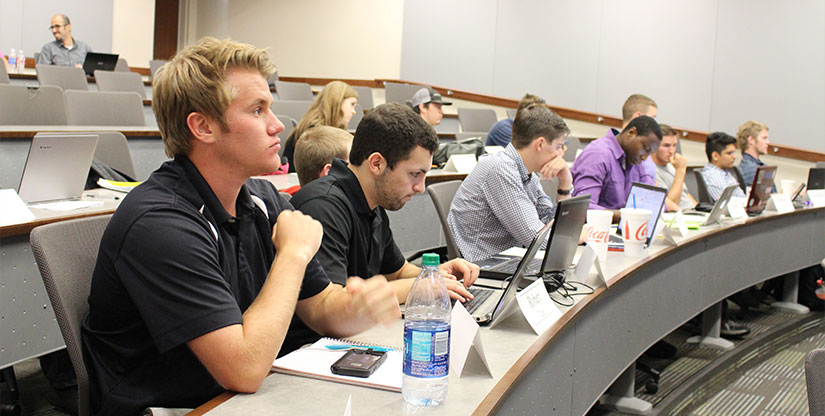Real World Business Success from the Classroom
February 19, 2016
Professor Ron Mitchell brings reality to his entrepreneurship class with a format that students call Shark Tank with do-overs.
Universities are focusing on how they can be more entrepreneurial. Angel networks and venture capital groups are flourishing. Even "Sesame Street" is getting into the act with the launch in February of Sesame Ventures to fund emerging companies aligned with the group's child-focused mission.
University students across the country are demanding more entrepreneurship-related courses and experiences. Texas Tech University has embraced those student desires and its regional economic prosperity mission. During the spring 2014 student government elections, students were asked a series of engagement and innovation questions. Of Texas Tech's more than 35,000 students, 6,017 responded to the questions. Just more than 1,000 already were engaged in inventing or entrepreneurship and about 4,000 expressed interest in becoming involved.
The student poll was part of Texas Tech's successful application for the Innovation and Economic Prosperity Designation from the Association of Public Land-Grant Universities. It also served as a catalyst to form a university-wide student entrepreneurial organization. Discipline-specific student organizations have developed in colleges from business to visual and performing arts. Classes have been created or redeveloped to include innovation and entrepreneurship. Numerous pitch competitions, workshops and formal 3-Day Startup programs have blossomed on the campus.
While entrepreneurship activities are exploding all over Texas Tech, one professor has fostered the evolution for more than a decade. Ronald Mitchell is professor of entrepreneurship and holds the Jean Austin Bagley Regents Chair in Management in Texas Tech Rawls College of Business.
He began teaching a cross-campus technology commercialization course in 2009, the first class of its type at Texas Tech. The course is designed to bring students from varying disciplines together to learn how to develop TTU technologies and student ideas into marketable products – or in some cases, learn that an idea simply will not work, and how to overcome these obstacles.
Mitchell came to Texas Tech in 2005 from the University of Victoria, BC, Canada, where he was an award-winning entrepreneurship program designer, and chaired professor of business and public policy, after a career as a CPA and as a turnaround CEO for several organizations.
Through his business experience and doctoral research, Mitchell is one of the creators of the entrepreneurial cognition research stream, which explains why and how some people gain entrepreneurial expertise, while others do not.
"The thing that I kept seeing was that people who were starting businesses were running into the same avoidable problems," Mitchell said. "We found that it is their knowledge and thinking system that explains variations in their expertise. Novices tend to be very superficial in their thinking. So, I became interested in teaching students how to deepen their thinking, and thereby to understand the avoidable errors in their own plans and how to remove the obstacles to their success."
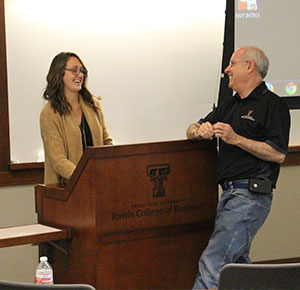 Gertrude's Golden Eggs
Gertrude's Golden Eggs
Mitchell's students go through the process of actually creating a business or validating a technology. They learn to create a business model, develop plans for finding financing and evaluating the marketing for their ideas.
"To understand value creation, we use an exercise in which we imagine that Gertrude the golden goose lays golden eggs worth maybe $1,200 each every 10 minutes," he explained. "I then ask how many people would invest a dollar in Gertrude. Of course they all do. Then how about $1,000? They may hesitate then, but Gertrude honks and lays another imaginary egg and they're all in. It's a matter of teaching them that financing is not the issue – instead it is communicating the assurance of value creation."
But not every idea is as golden, or as obvious, as Gertrude's eggs.
Mitchell believes that success often lies in seeing an opportunity and knowing what to do with it. "Innovation can be as simple as hearing someone complaining that you just can't get a good "fill-in-the blank." Entrepreneurs figure out why you can't get a good whatever, and remove the obstacles. Once you've done the homework, and can demonstrate that the business can create new value, like Gertrude, you can find your funding."
Adding reality to the classroom
About eight years ago, Mitchell added an essential element to his commercialization classes: a professional entrepreneur, who brings $2 million to the class for potential funding each semester. Marc Gunderson is an experienced entrepreneur with businesses that take him around the world on a weekly basis. But every Monday of Texas Tech's fall and spring semesters, his work is in Mitchell's classroom.
His involvement started simply enough, his son was an MBA student taking Mitchell's entrepreneurship class.
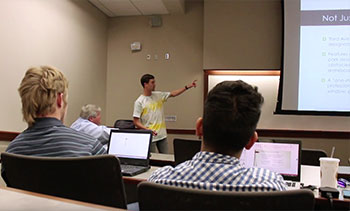 "Ron asked the class if they knew any true entrepreneurs who would come speak to the
class and my son Will said yes," Marc Gunderson said. "It started where I'd come a
couple times a semester. I live in Fort Worth, so at that time it wasn't difficult."
"Ron asked the class if they knew any true entrepreneurs who would come speak to the
class and my son Will said yes," Marc Gunderson said. "It started where I'd come a
couple times a semester. I live in Fort Worth, so at that time it wasn't difficult."
Gunderson realized that he had some of the same issues with the conventional wisdom about entrepreneurship that Mitchell did.
"A lot of books basically said come up with an idea and go see a venture capitalist and they'll give you money and you can start your business," he said. "It's just not that easy. These students needed to learn the details through real-life scenarios."
It was that point that the class format changed and Gunderson was named Entrepreneur-in-Residence of the Rawls College of Business; and he began to come to the class weekly. The bottom line of the class remains the same, every student earns a grade. Not every idea students work on will be mature enough for funding; but for those that do, there is now a strong possibility that the project can move beyond the class toward reality.
Shark Tank with Do Overs
In this class format, students are put into groups made up of varying majors and expertise. Each student signs a non-disclosure document. "They know they are there for a grade and there is no obligation to pursue a venture on our part, or on their part," he said. "They understand this is about learning how to make a group successful."
Part of the experience is learning to work with people with expertise other than your own (e.g. engineers working with business people). "A lot of engineers are excellent entrepreneurs, but they know nothing about finance or management. They get frustrated with the business folks and the business majors get really frustrated with the engineers," he said. "Usually about the fourth week, there's a Eureka moment when people realize that they need each other to be successful. We see it every semester."
Each group is required to make presentations to the class, Mitchell and Gunderson, a process Mitchell describes as "Shark Tank with do-overs." The student groups re-present almost every week so that the concepts taught in the class are experientially learned. This means "do- look-learn," replaces the more common "learn-look-do."
From Class to Reality
However, Gunderson isn't there just to offer advice. In a very few instances, he has assisted with taking a group's idea before potential investors.
"If I see a group or a project that I think has potential to be successful, I'll help them take their next step," he said. "That might mean moving a student I think will be a successful entrepreneur to working with another product. I have different investor groups that I can tap."
One of the biggest lessons Gunderson wants students to learn is that not everyone should be an entrepreneur. He sees a lot of students who believe that they must be entrepreneurs because their parents are.
"I remember one student who knew she needed to be an entrepreneur because her family owned a business; and she knew she'd have to run it one day," he said. "I drew up a scenario where when her parents retired she sold the business and went to work as a senior vice president for a national company in the same field. She was delighted with that idea and said it would relieve a lot of stress."
Just Go For It
But while neither Gunderson nor Mitchell ever discourage students from their entrepreneurial dreams, they do encourage them to learn the process; and they don't try to start your own business just because you want to work for yourself.
"In my opinion, the most misleading concept of being an entrepreneur is that you can just start a business and be successful immediately," said Gunderson. "The amount of work and the years of effort it takes to get to the point where you really are your own boss can often be a far, far greater number of years and lack of profitability than if you were to work for a Fortune 500 company."
That said, Mitchell has one piece of advice for students who want to be entrepreneurs: "Go for it."
Given the revolution in digital everything today, Mitchell believes that the world is entering a new Age of the Entrepreneur. "By 2030 almost half of the world's population will be under age 30," he said. "That could be 4 billion people under age 30. There likely will not be enough big corporation or government jobs for all of them. So my imagination just fires up. I see us building a type of public utility for entrepreneurship – plugins for youth so that they can learn how to become an entrepreneur. I'm thinking of places where they can get their funding through some sort of world entrepreneurial bank. There must be a way to remove the obstacle of lack of education so that people can plug into the entrepreneurial world at a high level, and be empowered to remove the obstacles to creating value for them and for those around them."
Start a New Business – in 72 Hours
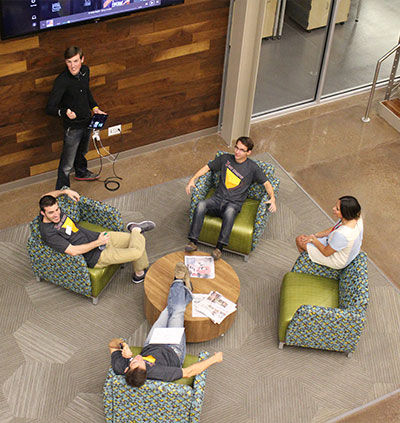 Entrepreneurial opportunities for Texas Tech students have multiplied in the past
two years. Student groups have sprung up. Pitch and business competitions are common
place. However, the most intensive of all may be 3 Day Startup (3DS).
Entrepreneurial opportunities for Texas Tech students have multiplied in the past
two years. Student groups have sprung up. Pitch and business competitions are common
place. However, the most intensive of all may be 3 Day Startup (3DS).
During the program students spend 72 hours learning how to create their own startup business, said Jennifer Horn, director of entrepreneurialism and translational research in Texas Tech's Office of Research & Innovation. It's a high-energy, hands-on environment that allows groups of students to develop an idea, do the market research, build a business plan and finally present their business concept to a panel of business leaders and entrepreneurs.
"Some of our students come into 3DS with a definite idea for a business, some come just to learn the process," said Horn. "Regardless, the students come away with a new skill set, a new way to view their ideas and a better understanding of how to bring them to the marketplace."
The program is free, and acceptance is based on a competitive application process. About twice as many students apply as can be accepted. The 40-to-50 students who are accepted attend a brief boot camp one to two weeks prior to the actual 3DS event to learn key entrepreneurship principals and best practices for maximizing the experience.
The 3DS weekend begins by taking students through the initial concept development and group selection process. Day two focuses on customer discovery and business model development with the help of mentors. The final day hones the business plan and concludes with presentations before a panel of mentors and investors.
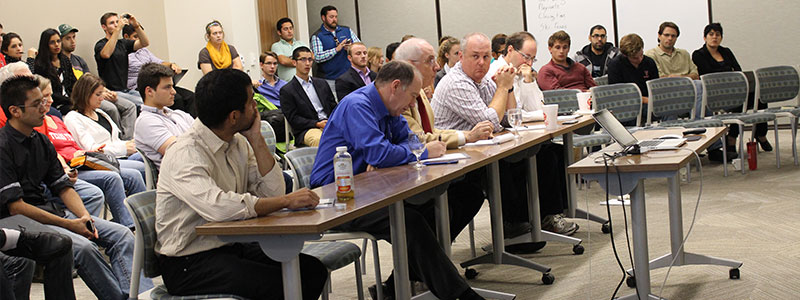
For Dr. Ronald Mitchell, professor of entrepreneurship who holds the Jean Austin Bagley Regents Chair in Management in Texas Tech's Rawls College of Business, the most important part of 3DS is that the program is the practical hands-on experience.
"Often for students there is a kind of rickety bridge between theory and practice," Mitchell said. "So much regular university learning is based on the "learn-look-do" method. But 3DS is all about practice it is based on the reverse: the "do-look-learn" principle. Because of that this program is a marvelous effect on the confidence and the imagination of the students who participate."
One of those students is James Lilly. He was so taken with the 3DS experience, he's become part of the Texas Tech leadership team. And now he's taking his own version of the weekend-long program into high schools.
Lilly has created Art of Start (AOS) and will present the first program in late April at Midland Christian School, his alma mater.
"We hope to have 28 students from Midland Christian and five from Frenship High School," he said.
Creating interest in his program was easier than expected. The Midland Christian School superintendent was familiar with Lilly from his time as a student there.
"Mr. Lee knows me and was completely accepting," Lilly said. "He asked me to come do an in-person presentation. He signed off and we were ready to go."
While Lilly is preparing for his first solo-effort he's also looking ahead. "At some point I'm going to graduate from Tech and get a job and won't be able to continue to lead AOS," he said. "I've developed a relationship with the teachers and have three teachers that work with me this year so that they can lead the event next year."
The 3DS training has taught Lilly valuable lessons in management that he'll carry forward into his future career.
"I have found that if you give people your time and show them that you're really interested in them, that's what gets them motivated," he said. "As a management major I'm interested in that aspect. But personally, helping to teach students the program has made me a lot more confident in what I learned. I've always heard that you learn more by teaching, and this experience has taught me that is so true."

